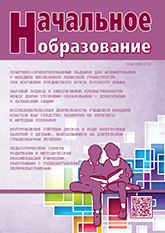Moskva, Moscow, Russian Federation
The article discusses the problem of differentiation of education at the present stage of development of the first school link in education. The article reveals the features of ensuring a differentiated approach, taking into account groups of students that differ in the level of success in learning and development. The characteristics of children belonging to different groups and in need of teacher's pedagogical support are given. The author proves the need for a teacher to use a differentiated approach to teaching younger schoolchildren, who usually fall out of the zone of the teacher's everyday attention - the so-called good and satisfactory students.
the status of a modern elementary school student; unified educational space; the principle of variability of education; differentiation of teaching; successful learning and development of different groups of children; pedagogical support
1. Vinogradova N.F. Kontseptsiya nachal'nogo obrazovaniya: «Nachal'naya shkola XXI veka» [The concept of primary education: "Primary school of the XXI century"]. Moscow: Ventana-Graf Publ., 2017. 65 p.
2. Davydov V.V. Problemy razvivayushchego obucheniya: opyt teoreticheskogo i eksperimental'nogo psikhologicheskogo issledovaniya [Problems of Developmental Education: The Experience of Theoretical and Experimental Psychological Research]. Moscow: Pedagogika Publ., 1986. 240 p.
3. Zinchenko V.P. Psikhologicheskie osnovy pedagogiki (Psikhologo-pedagogicheskie osnovy postroeniya sistemy razvivayushchego obucheniya D.B. El'konina - V.V. Davydova) [Psychological foundations of pedagogy (Psychological and pedagogical foundations of building a system of developing education by DB Elkonin - VV Davydov)]. Moscow: Gardariki Publ., 2002. 431 p.
4. Istoriya stanovleniya i razvitiya metodik nachal'nogo obrazovaniya. Pervaya polovina KhKh veka [The history of the formation and development of methods of primary education. First half of the twentieth century]. Moscow; St. Petersburg: Nestor-Istoriya Publ., 2013. 253 p.
5. Podd"yakov A.N. Issledovatel'skoe povedenie: strategii poznaniya, pomoshch', protivodeystvie, konflikt [Exploratory behavior: cognition strategies, help, counteraction, conflict]. Moscow: Natsional'noe obrazovanie Publ., 2016. 304 p.
6. Rydze O.A. Uchebno-poznavatel'naya samostoyatel'nost' mladshego shkol'nika: nauchno-metodicheskoe soprovozhdenie protsessa formirovaniya [Educational and cognitive independence of a younger student: scientific and methodological support of the formation process]. Moscow: Ventana-Graf Publ., 2017. 143 p.
7. Universal'nye uchebnye deystviya kak rezul'tat obucheniya v nachal'noy shkole. Soderzhanie i metodika formirovaniya universal'nykh uchebnykh deystviy mladshego shkol'nika [Universal learning activities as a result of primary school education. Content and methodology for the formation of universal educational actions of a younger schoolchild]. Moscow: Institut strategii razvitiya obrazovaniya RAO Publ., 2016. 218 p.
8. Federal'nyy gosudarstvennyy obrazovatel'nyy standart nachal'nogo obshchego obrazovaniya [Federal state educational standard of primary general education]. Moscow: Prosveshchenie Publ., 2011. 32 p.
9. Funktsional'naya gramotnost' mladshego shkol'nika [Functional literacy of a primary school student]. Moscow: Ventana-Graf Publ., 2018. 280 p.
10. El'konin D.B. Intellektual'nye vozmozhnosti mladshikh shkol'nikov i soderzhanie obucheniya [Intellectual opportunities of primary schoolchildren and the content of education]. Vozrastnye vozmozhnosti usvoeniya znaniy (mladshie klassy shkoly) [Age possibilities of assimilation of knowledge (primary grades of school)]. Moscow: Prosveshchenie Publ., 1966, pp. 13-53.






